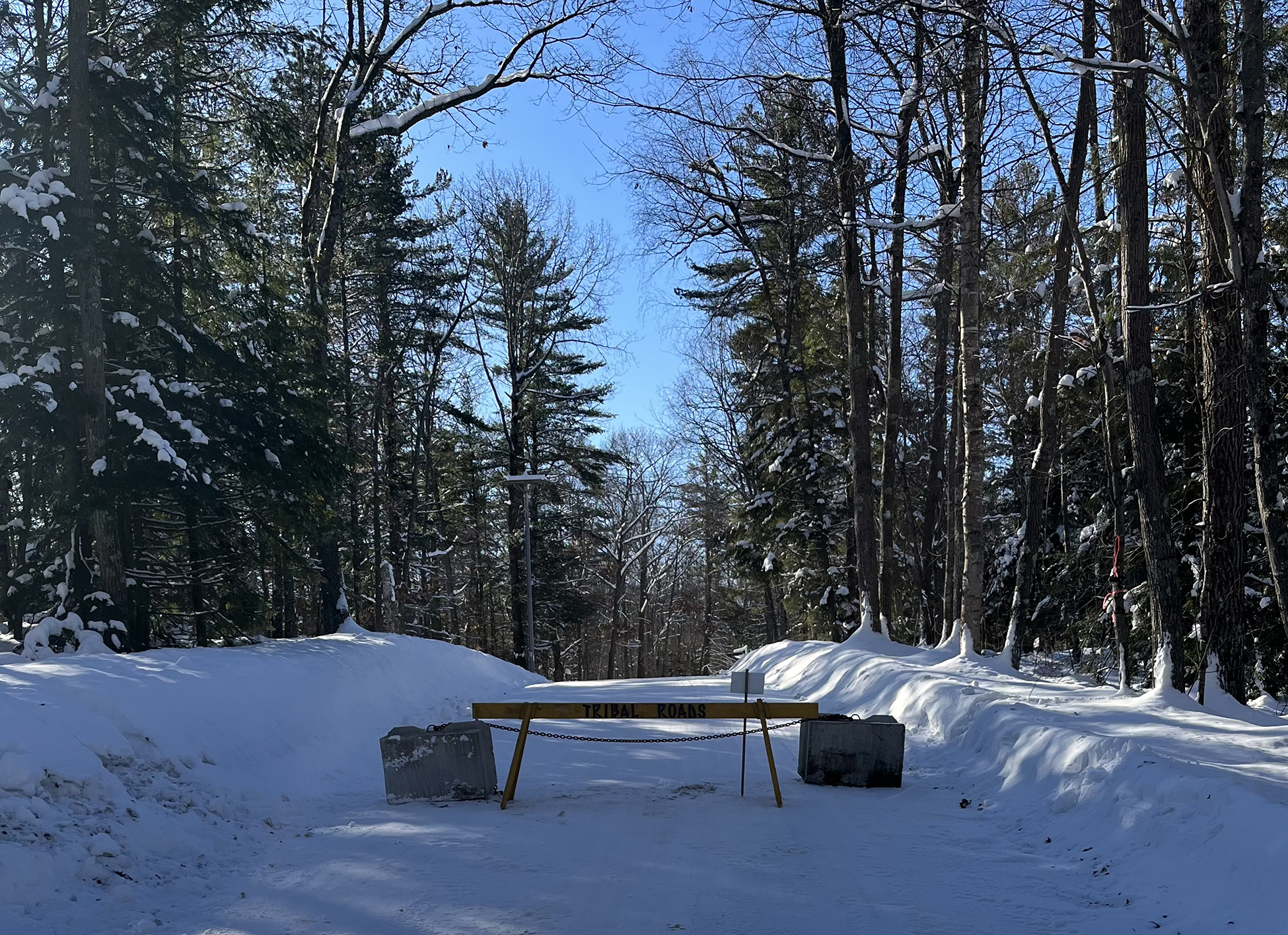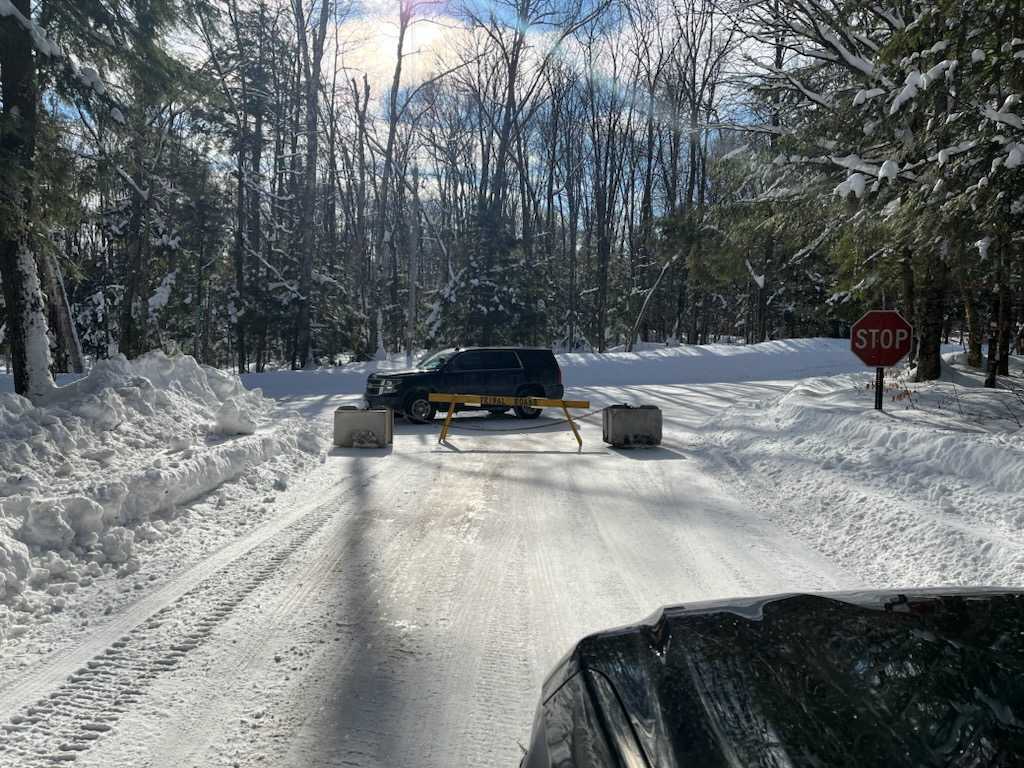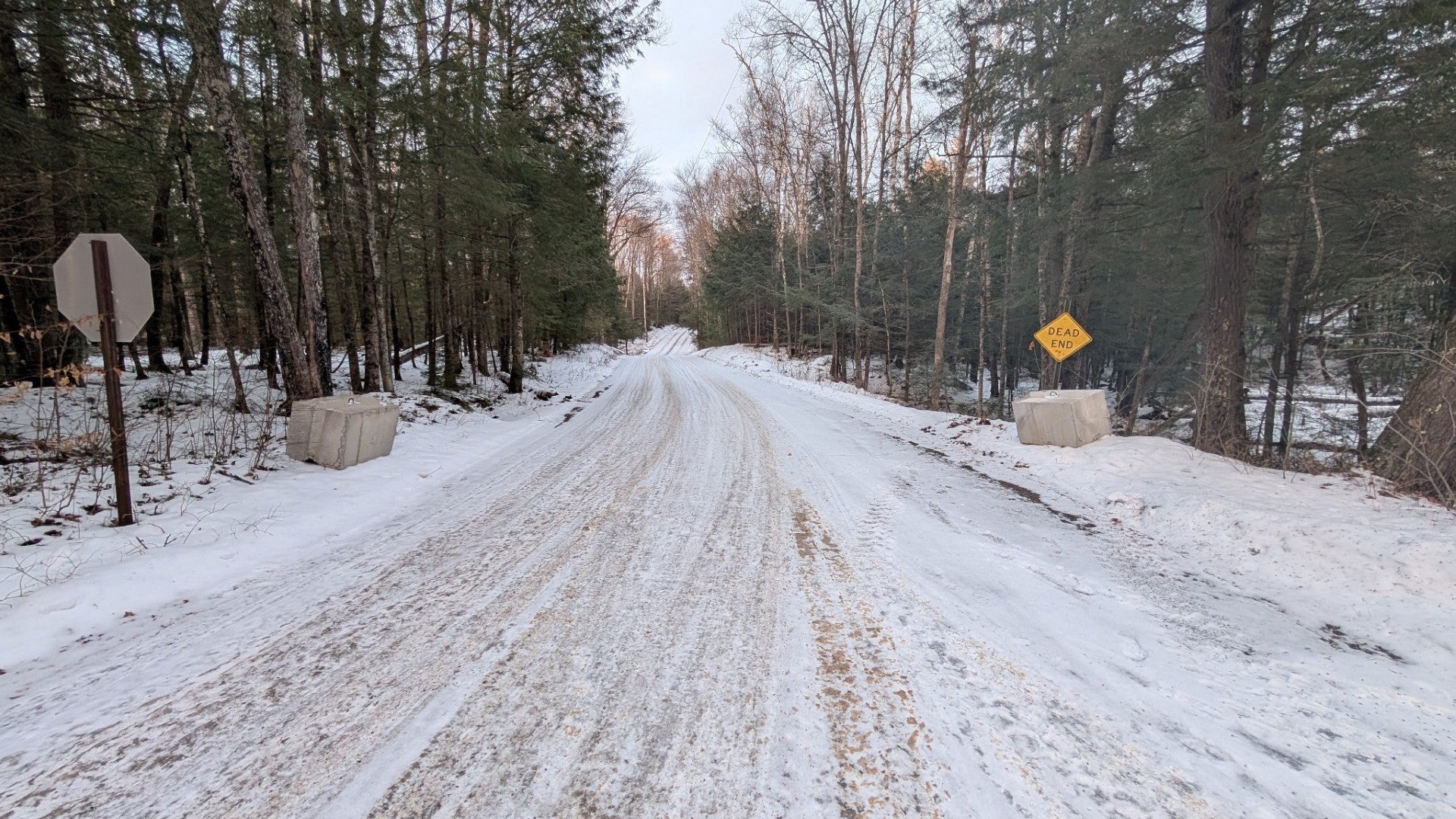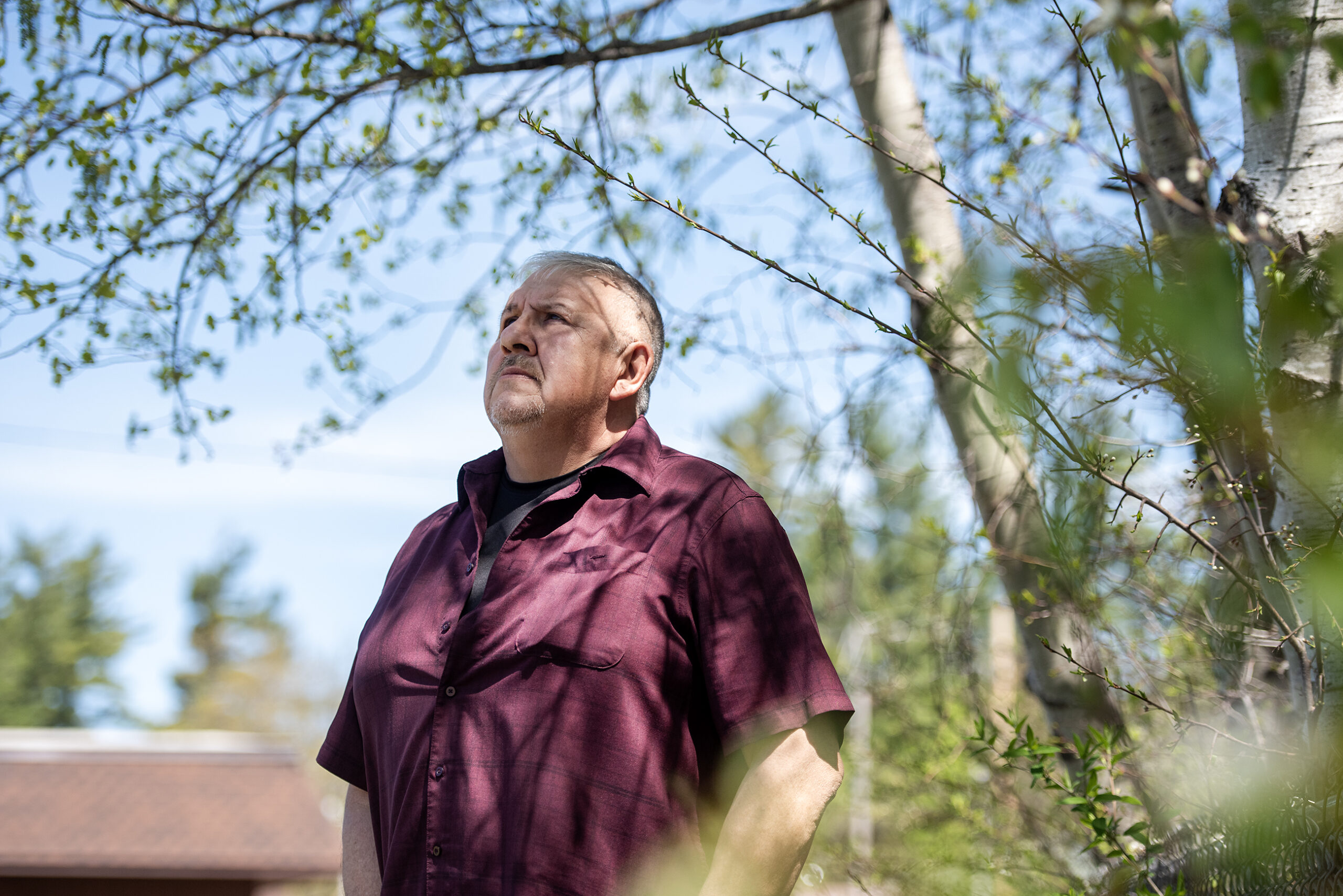Around 40 landowners are suing tribal leaders with the Lac du Flambeau Band of Lake Superior Chippewa to reopen four roads that have been blocked by barricades for a month.
The landowners filed a federal lawsuit Tuesday in the U.S. District Court for the Western District of Wisconsin. They’re asking the court to require the roads be immediately reopened and that they remain open for public use.
“(T)he Defendants took the law into their own hands and illegally barricaded public roadways, despite the fact that they must be ‘open and available to public use’ under federal law,” the complaint states. “The Defendants also installed cameras and threatened Plaintiffs that any attempt to use the unlawfully barricaded roadways would be subject to criminal prosecution for trespass.”
Stay informed on the latest news
Sign up for WPR’s email newsletter.
On Jan. 31, residents living along Center Sugarbush Lane, East Ross Allen Lake Lane, Elsie Lake Lane and Annie Sunn Lane had access to and from their homes blocked by an order of the Lac du Flambeau Tribal Council. The closures were the culmination of failed negotiations over right-of-way easements that expired in 2010. The tribe had attempted to secure 25-year easements from the town of Lac du Flambeau and title companies that handle the properties accessed by the roads. The tribe has said it made “numerous” attempts without success to resolve the expired easements by working with the Bureau of Indian Affairs.
Bridget Hubing, an attorney representing landowners, said in a statement late Wednesday that her Madison-based law firm Reinhart Boerner Van Deuren is now representing 41 of 65 families affected by the roadblocks.
“During the four weeks that the barricades have been blocking access, we made two settlement offers, presented a mediation proposal and requested an informal meeting with the Tribe. Thus far, the Tribe has failed to substantively respond to any of our communications and has refused to remove the illegal barricades,” Hubing said.
She went on to say the decision to file the lawsuit was not made lightly. Hubing said they hope the tribal council will remove the barricades and engage in negotiation to reach an amicable and appropriate resolution.
The tribe has said it wants $20 million from the town and title companies to secure an agreement. Tribal officials say that would allow property owners access and make up for illegal use of tribal lands since the easements expired. A spokesperson for the tribe and Lac du Flambeau Tribal President John Johnson, Sr. did not immediately respond to requests for comment.
In the complaint, landowners argue the roads are the only way in and out by vehicle, noting trees and snow prevent access around the barricades. They contend the roads must be open to the public because they’re listed in the National Tribal Transportation Facilities Inventory. The complaint states only the Interior Secretary or a public authority with jurisdiction over those roads — in this case the town — can restrict use or close them temporarily, and only under limited circumstances.

University of Wisconsin-Madison law professor Richard Monette said landowners are suing tribal leaders to force them to comply with federal law that authorizes funding for roads in Indian Country under the federal program.
Monette said those homeowners will likely have to bring their case to tribal court first. He said that’s due to the relationship landowners have with the Bureau of Indian Affairs, the tribe or both relative to the roads in question. In such instances, the U.S. Supreme Court has ruled it’s important to exhaust remedies at the local level first, which includes the tribe, especially when there’s a consensual relationship like situations with a lease.
“It’s important to exhaust the local sovereign’s remedies first for a whole bunch of reasons, (including) efficiency for the court system, etc., but also get the benefit of the local sovereign’s reading of what’s at play,” Monette said.
While landowners contend the roads are public because they’re funded by a federal program, Monette said that argument wouldn’t hold sway with areas like national parks and military bases.
“And I don’t think that anybody’s going to conclude that just because those are included in their inventory of reservation roads, that somehow that makes them public in that way,” Monette said.
Monette said there’s plenty of blame to go around. Still, he said some fault lies with the tribe. If it had set up a property records office, title companies would be able to work more directly with them rather than relying on the Bureau of Indian Affairs.
Landowners also claim actions by tribal leaders have caused an “imminent threat” to public health and safety. The tribe does allow people to come and go for medical needs. However, the complaint states law enforcement and first responders must stop to open a locked chain between blocks and a wooden barricade that could extend the amount of time to receive emergency services. In one instance, they say it took tribal police 50 minutes to get the right key to open the locked chains.
“Some Plaintiffs and other residents impacted by Defendants’ unlawful closure of the Roadways have been forced to flee their homes in order to ensure that critical care for infirm family members or for themselves is not interrupted,” the complaint states.
Rachel Pearson is among residents who filed the lawsuit. She and her husband Dennis have their vehicles parked at a nearby neighbor’s home. To get to them, they cut a trail through private roads and cross a frozen lake by snowmobile. Pearson, who drives an hour to work in Rhinelander, said it’s added about an hour to her day just to get to and from work.
She’s concerned about how they’ll get to work once the lake starts to thaw.
“Once ice is off all of the way, I could potentially kayak,” Pearson said. “But at that point, it’s getting ridiculous. I leave too early in the morning and come home too late that I’d hate to be doing that in the dark.”
She’s upset with the title companies and town for not informing residents about the dispute over easements for more than 10 years. She thinks the town, the title companies and the tribe are at fault for putting residents in this situation.
Even so, Pearson said she wants a fair outcome for the tribe.
“I’m trying to be as respectful as possible, but I feel like all my rights have been taken away, so it’s more and more difficult to feel that way,” she said.
A spokesperson with the Bureau of Indian Affairs said in a statement the federal government has an obligation to uphold tribal sovereignty.
“(That) includes ensuring that Tribes have the ability to consent to the use of its lands. We have been in communication with the Lac du Flambeau Tribe, as well as state and other officials, and will continue to support efforts to reach a positive outcome,” the spokesperson wrote. “It is important that people seeking access to the Tribe’s lands communicate directly with the Tribe. The Bureau of Indian Affairs will follow all applicable laws and regulations when reviewing any agreements for use of Tribal lands.”
A message left for town of Lac du Flambeau chair Matt Gaulke was not immediately returned.
Multiple elected officials have called for a resolution to the road dispute, including U.S. Sen. Tammy Baldwin, Gov. Tony Evers, and Congressman Tom Tiffany.
The Lac du Flambeau reservation has a population of more than 3,500 residents. The tribe’s lands span 86,600 acres in northern Wisconsin, primarily in Vilas County.
Editor’s note: An earlier version of this story stated that Bridget Hubing is an attorney representing landowners and title companies. It’s been updated to reflect that Hubing only represents landowners.
Wisconsin Public Radio, © Copyright 2025, Board of Regents of the University of Wisconsin System and Wisconsin Educational Communications Board.


